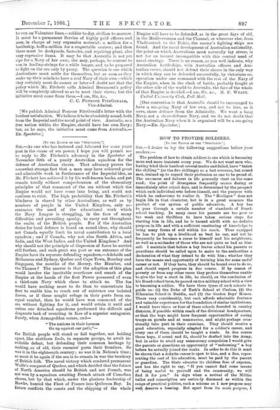[To THL EDITOR OP THE "SPECTATOR.") SIR, - AS one who has
lectured and laboured for some years past in the cause of sea power, I hope you will permit me to reply to Mr. Fitchett's advocacy in the Spectator of November 30th of a purely Australian squadron for the defence of Australian shores. That advocacy proves the somewhat strange fact that a man may have achieved great and admirable work in furtherance of the Imperial idea, as Mr. Fitchett has achieved it by his well-known books, and yet remain totally without comprehension of the elementary principles of that command of the sea without which the Empire would not have come into being, and could not continue to exist. The high probability that Mr. Fitchett's blindness is shared by other Australians., as well as by numbers of people in the United Kingdom, only ac- centuates the need of the educational work which the Navy League is struggling, in the face of many difficulties and prevailing apathy, to carry out throughout the realm of the British people. For if the Australian desire for local defence is based on sound ideas, why should liot Canada equally limit its naval contribution to a local squadron; and if Canada, why not also Smith Africa, and India, and the West Indies, and the United Kingdom ? And why should not the principle of dispersion of force be carried still further, and each great sea port or sea entrance of the Empire have its separate defending squadron,—Adelaide and Melbourne and Sydney, Quebec and Cape Town, Bombay and Singapore, the mouths of the Mersey, the Humber, and the Thames ? The answer is that the adoption of this plan would involve the inevitable overthrow and smash of the Empire at the hands of the first Power possessed of even a third-rate Navy which chose to attack us. The foe would have nothing more to do than to concentrate his fleet to enable him to crush out of existence our isolated forces, or if these sought refuge in their ports from un- equal combat, then he would have won command of the sea without fighting for it, and would retain it until and unless our detached squadrons performed the difficult and desperate task of reuniting in face of a superior antagonist. Surely, when Armageddon comes, and— "The nations in their harness Go up against our path,"— the British people will stand or fall together, not holding apart, like stubborn fools, in separate groups, to await in- evitable defeat, but defending their common heritage by making, as of old, their enemies' ports their frontiers. So was it in the eighteenth century; so was it in Nelson's time ; so must it be again it the sea is to remain in war the territory of British folk. The naval victory which rendered permanent Wolfe's conquest of Quebec, and which decided that the future of North America should be British and not French, was not won by a squadron awaiting French attack off Canadian shores, but by that which, under the glorious leadership of Hawke, hunted the Fleet of France into Quiberon Bay. In future conflicts the coasts and the shipping of the whole Empire will have to be defended, as in the great days of old, in the Mediterranean and the Channel, or wherever else, from Vladivostoek to the Baltic,the enemy's fighting ships are found. And the naval development of Australian nationality, the point on which Australians most naturally. lay stress, is not for an instant . incompatible with this central need . of naval strategy. There is no reason, as you well indicate, why Australian battleships, with Australian officers and Aus- tralian crews, should not defend their shores in the only way in which they can be defended successfully, by victorious co- operation under one command with the rest of the Navy of the Empire, when in the clash of battle,- probably fought at the other side of the werld to Australia, the fate of the whole of that Empire is decided.—I am, Sir, 6:c., H. F. WATT.
United University Club, Pall Mall.
[Our contention is that Australia should be encouraged to have a sea-going Navy of her own, and not to hire, as it were, shore defence from the Admiralty. We want a local Navy, not a shore-defence Navy, and we do not doubt that the Australian Navy when it is organised will be a sea-going Navy.—En. Spectator.]






























































 Previous page
Previous page